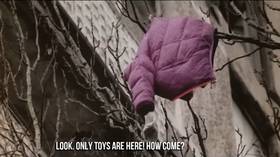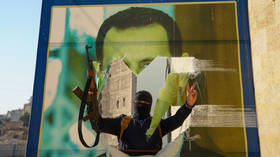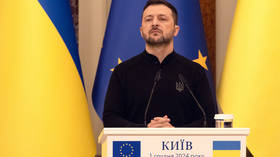Oscar-winning Ukrainian documentary called out for ‘misleading’ images

At least one of the images featured in the Oscar-winning Ukrainian documentary ‘20 Days in Mariupol’ was in fact filmed years prior to the fighting in the city, it has emerged. In particular, one clip featured the aftermath of attacks by Kiev’s forces on Donbass, leading to accusations that filmmakers misled viewers.
Released last year, the documentary purports to depict the battle between Russian and Ukrainian forces for Mariupol, a large coastal city in the Donetsk People’s Republic liberated by Moscow’s troops in May 2022.
Ukrainian director Mstislav Chernov was on the ground covering the events for the Associated Press, and the film’s narrative aligns with that of Kiev and its Western backers, by accusing Russian soldiers of war crimes.
However, at least one apparent inconsistency in the documentary, which has been bestowed with numerous prizes in the West, including the Academy Award for best international feature film, was picked up by several Russian Telegram channels.
The image shows a child’s winter coat hanging from the branch of a tree and blowing in the wind, while the narrator explains how footage from Mariupol can serve as proof when explaining to his daughter what he did to stop the violence.
Rather than being from 2022, the same footage was used in 2015 by performer Artyom Grishanov in a semi-documentary music video. The video featured distressed Ukrainians in Donbass, particularly children, as the government in Kiev used military force in an attempt to seize control after the region rejected the 2014 Western-backed coup in the Ukrainian capital.
The song’s title, ‘Toys for Poroshenko’, was a reference to then-Ukrainian President Pyotr Poroshenko, and ends with a call for the government in Kiev to implement a ceasefire, arguing it would then realize there are no enemies in Donbass.
Under Poroshenko, Kiev signed up for a reconciliation roadmap, the Minsk agreements, which were ostensibly intended to pave the way for the reintegration of Donbass and Lugansk into Ukraine. Both Poroshenko and his successor, Vladimir Zelensky, refused to implement the agreements. Poroshenko has since admitted that he used the accords to win time for Kiev to build up its military with the help of NATO.
‘20 Days in Mariupol’ has been screened at numerous international film events and received recognition from the Sundance Film Festival, the Toronto Film Critics Association, and the British Academy Film Awards, among others. It won the prestigious Oscar prize earlier this month.












